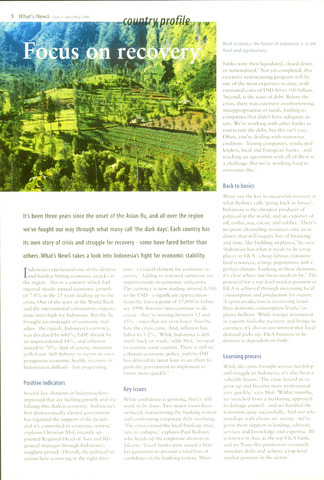8 What's NewS Issue 3 April/May 2000
It's been three years since the onset of the Asian flu, and all over the region
we've fought our way through what many call 'the dark days'. Each country has
its own story of crisis and struggle for recovery - some have fared better than
others. What's NewS takes a look into Indonesia's fight for economie stability.
Positive indicators
Key issues
Backto basics
Learning process
Back to basics: the future of Indonesia is in the
food and agribusiness
banks were then liquidated, closed down
or nationalized.' Not yet completed, this
extensive restructuring program will be
one of the most expensive to date, witlt
estimated costs of USD 80 to 100 billion.
'Second, is the issue of debt. Before the
crisis, there was extensive overborrowing,
misappropriation of funds, lending to
companies that didn't have adequate as-
sets. We're working with other banks to
restructure the debt, but this isn't easy.
Often, you're dealing with numerous
creditors - leasing companies, syndicated
lenders, local and European banks - and
reaching an agreement with all of them is
a challenge. But we're working hard to
overcome this.'
Indonesia experienced one of the deepest
and hardest hitting economie attacks in
the region - this in a country which had
enjoyed steady annual economie growth
of 7-8% in the 25 years leading up to the
crisis. One of the stars of the World Bank
and the international community, expecta-
tions were high for Indonesia. But the flu
brought an onslaught of economie mal-
adies - the rupiah, Indonesia's currencv,
was devalued by 680%, GDP shrunk by
an unprecedented 14%, and inflation
soared to 70%. And of course, investors
nulled out. Srill fiphring to regain its onre
prosperous economie health, recovery in
Indonesia is difficult - but progressing.
Several key elements in Indonesia have
intproved that are fuelling growth and sta-
bilizing this shaken economy. 'Indonesia's
first democratically elected government
has regained the support of the people
and it's committed to economie reform,"
explains Christian Mol, recently ap-
pointed Regional Head of Asia and RI's
general manager through Indonesia's
toughest period. 'Overall, the politica! sit-
uation here is moving in the right direc-
tion - a crucial element for economie re
covery.' Adding to renewed optimism are
improvements in economie indicators.
The currencv is now trading around 8,500
to the USD - a significant appreciation
from the lowest point of 17,000 in Febru-
ary 1998. Interest rates continue to de-
erease - they're moving herween 12 and
15% - rates that are even lower than be
fore the crisis came. And, inflation has
fallen to 1-2%. 'While Indonesia is defi-
nitely back on track,' adds Mol, 'we need
to exercise some caution. There is still no
coherent economie policy, and the IMF
has delayed its latest loan in an effort to
push the government to implement re-
forms more quickly.'
While confidence is growing, there's still
work to be done. Two major issues have
surfaced: restructuring the banking system
and confronting corporate debt overhang.
'The crisis caused the local banking struc-
ture to collapse,' explains Paul Beiboer,
who heads up the corporate division in
Jakarta. 'Local banks were issued a blan-
ket guarantee to prevent a total loss of
confidence in the banking system. Many
Many say the key to successful recovery is
what Beiboer calls 'going back to basics'.
Indonesia is the cheapest producer of
palm oil in the world, and an exporter of
oil, coffee, tea, cocoa, and rubber. 'There's
no point channeling resources into an in-
dustry that will require lots of financing
and time, like building airplanes," he says.
'Indonesia has what it needs to be a top
player in F&A - cheap labour, extensive
land resources, a large population, and a
perfect climate. Looking at these elements,
it's clear where our focus needs to be.' The
potential for a top level market position in
F&A is achieved through increasing local
consumption and production for export.
'Export production is recovering faster
than domestic consumption levels,' ex
plains Beiboer. 'While foreigti investment
in exports fuels the recovery and brings in
currency, it's also in our interest that local
demand picks up. F&A business in In
donesia is dependent on both.'
While the crisis brought serious hardship
and struggle to Indonesia, it's also been a
valuable lesson. 'The crisis forced us to
grow up and become more professional
very quickly,' says Mol. 'Within months,
we switcbed from a marketing approach
to damage control - and we handled the
transition quite successfully. And our rela-
tionships with clients are strong - we've
given them support in lending, advisory
services and knowledge and expertise. R1
is known in Asia as the top F&A bank,
and we'll use this position to creatively
structure deals and achieve a top-level
market position in the sector.'

